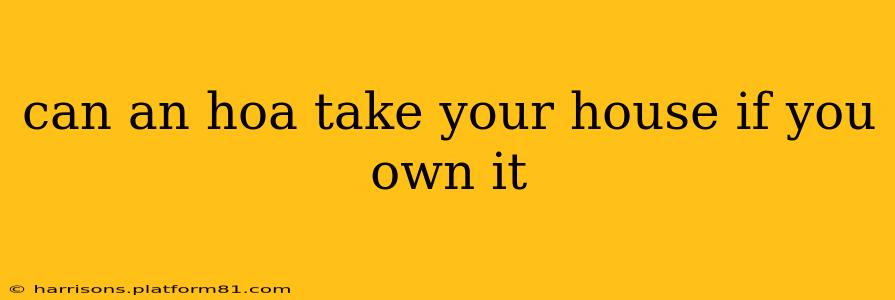Can an HOA Take Your House If You Own It?
The short answer is: generally, no, an HOA cannot directly take your house if you own it. However, they possess significant power to impact your ownership, and in extreme cases, force a sale. Let's explore the nuances of this complex issue.
HOAs (Homeowners Associations) are legally established entities governing common areas and establishing rules within a community. Their power stems from the covenants, conditions, and restrictions (CC&Rs) that are legally binding agreements you accepted when purchasing your home. These documents outline the rules and regulations you agreed to follow. Violation of these rules can lead to a range of consequences, from fines to, ultimately, legal action.
How Can an HOA Impact Your Home Ownership?
While an HOA can't simply seize your house, they can pursue various legal avenues to address serious and persistent violations:
- Fines: Repeated or significant violations often result in escalating fines. These fines can accumulate quickly, becoming a substantial financial burden.
- Liens: If you fail to pay fines, the HOA can place a lien on your property. This means the debt is attached to your house, and it will need to be paid before you can sell or refinance.
- Foreclosure: This is the most extreme measure. In some jurisdictions, if the accumulated fines and legal fees exceed a certain threshold, the HOA can initiate foreclosure proceedings, ultimately leading to the sale of your home to recover the outstanding debt. This is rare but possible. The process mirrors a bank foreclosure, but the initiating party is the HOA.
What Constitutes a Serious Violation?
The severity of a violation varies depending on the specific CC&Rs of your community. Common violations that could lead to serious consequences include:
- Significant exterior modifications: Unpermitted additions, renovations, or changes to the exterior appearance of your home (e.g., painting it an unauthorized color, adding a structure without approval).
- Repeated or egregious violations of community rules: Consistent disregard for established rules regarding noise levels, pet restrictions, garbage disposal, or parking.
- Neglect of property maintenance: Allowing your property to fall into disrepair, creating a nuisance for neighbors, or posing a safety hazard.
Can an HOA Evict You?
No, an HOA cannot evict you from your home. Eviction is a landlord-tenant issue. Since you own your home, the HOA's actions are focused on addressing violations of the CC&Rs, not on your tenancy. They can, however, pursue legal action to force the sale of the property to recover unpaid fees.
What are my Rights as a Homeowner?
- Review your CC&Rs: Familiarize yourself with the rules and regulations governing your community.
- Due process: The HOA must follow established legal procedures when pursuing legal action against you.
- Appeal process: Most HOAs have an internal appeal process for contested fines or violations.
- Legal representation: If facing serious consequences, consider seeking legal counsel specializing in HOA disputes.
How Can I Avoid HOA Problems?
- Communicate: If you're planning any modifications or have concerns about the rules, communicate with the HOA proactively.
- Follow the rules: Adhere to the CC&Rs to avoid incurring fines.
- Maintain your property: Keep your home and yard well-maintained.
- Pay your dues promptly: Avoid accumulating debt by paying your HOA fees on time.
In conclusion, while an HOA cannot directly take your house in most cases, significant and persistent violations can lead to legal action resulting in a forced sale to recover outstanding debts. Understanding your rights, the CC&Rs, and proactively addressing any concerns with your HOA is crucial to maintaining positive relations and protecting your investment.
